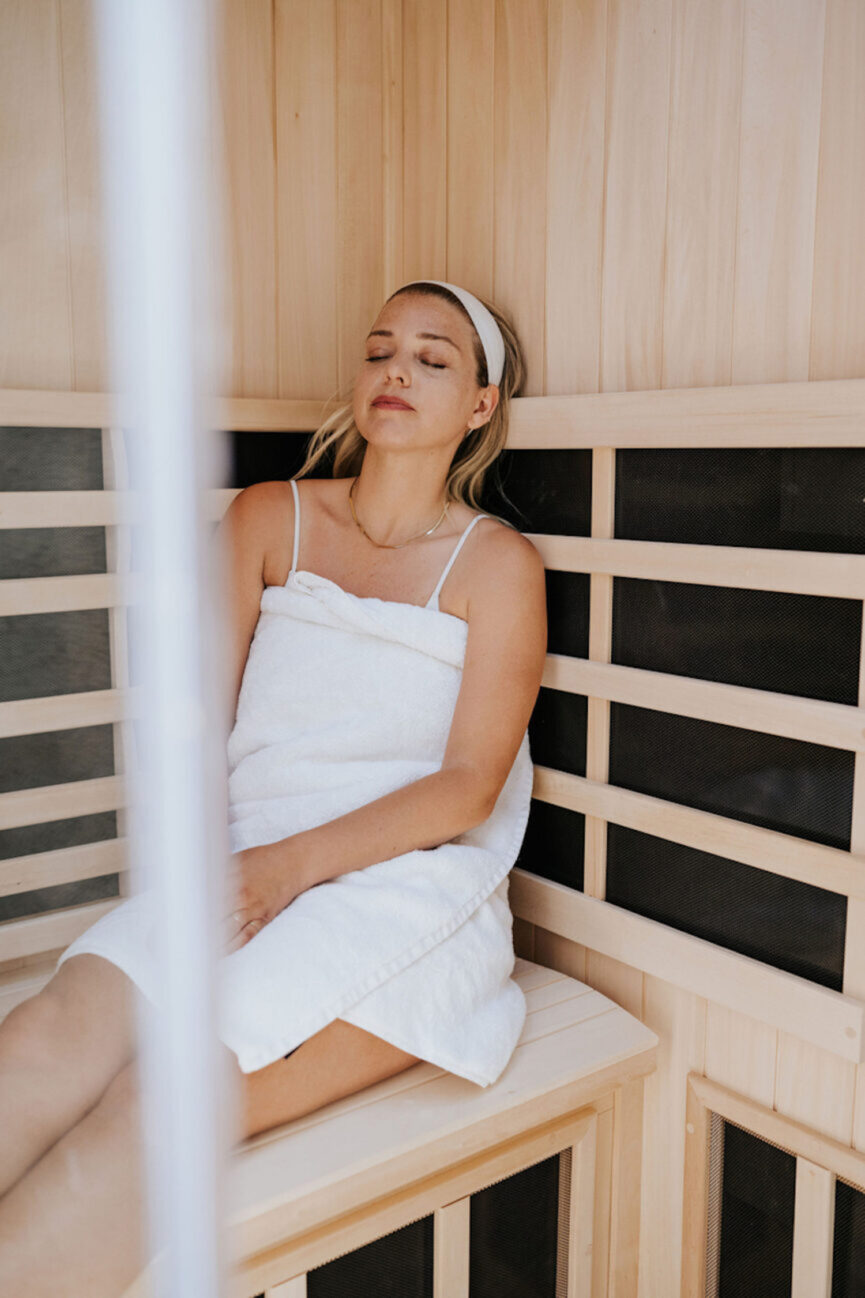If you purchase a product through a link in this article, we may receive a small share of the sale.
As the saying goes, nothing is certain except death, taxes, and waking up with a puffy face. You’ve tried cutting back on salt and going grain-free. You’ve invested in an “emotional support” water bottle. Maybe you’ve jumped on the ice rolling habit (or dunked your face in ice water every morning). You’ve tried everything, and nothing changes. When it feels like you’ve exhausted all other options, you know stress might be to blame. The internet is calling it cortisol face, pointing out the connection between cortisol and skin health.
Although sheet masks are super hydrating, this quick (and admittedly relaxing) solution isn’t going to do much to relieve stress in the long run. Don’t get me wrong—I’m wearing a face mask as I write this article—but if accumulated stress is wreaking havoc on your skin and body, it might be time to look more deeply into the relationship between cortisol and your skin.
Featured image from Michelle Nash’s interview with Sanne Vloet.
Cortisol and Skin: The Surprising Connection
Cortisol is the stress hormone. Like any hormone, an imbalance can wreak havoc on the body. Poor gut health can lead to estrogen imbalances, and B vitamin deficiencies affect testosterone. While the time frame varies from person to person, research shows that taking a holistic approach to health can help balance hormones. A few monthsThat’s why getting your cortisol levels back down to manageable levels is so important for your skin and every other aspect of your health.
To learn more about cortisol on the face and the relationship between cortisol and the skin, I Danuta MierotiMieloch is a celebrity esthetician (clients include Naomi Campbell and Rosie Huntington-Whiteley), owner of Rescue Spa, and founder of Danucela Skincare. She knows the power of combining intentional topical treatments with healthy habits, and she’s noticed a direct connection between skin-supportive, stress-relieving habits and healthy, elastic skin. Read on for Mieloch’s expert advice.




What is Cortisol Face?
Social media is filled with before-and-after reels showing dramatic transformations and what cortisol looks like on the face. “Recognizing these signs can help provide targeted, effective treatment,” says Mieloch. But if you’ve been experiencing elevated cortisol for a while (perhaps without realizing it and not recognizing stress as a baseline), the visible effects may not be as obvious. According to Mieloch, elevated cortisol can manifest as:
- Swelling. Do you wake up bloated the night after eating salty foods? Increased fluid and sodium retention are also symptoms of elevated cortisol levels.
- The redness increases. As the body tries to respond and regulate high cortisol, blood rushes to the skin, and increased blood flow can cause redness. Redness can also be a reaction to irritation caused by a compromised skin barrier.
- Acne. Cortisol increases sebum production, clogging pores with excess oil.
- Healing will be slower. Increased stress impairs the repair process and slows healing.
- inflammation. Cortisol leads to an increased inflammatory state and increased inflammation.
- Premature aging. The breakdown of collagen and elastin can lead to premature signs of aging, such as fine lines and sun spots.
Myths about cortisol and the skin
For all the claims of dramatic life-changing benefits, there are a lot of myths surrounding cortisol and skin. Now more than ever, more people are looking to find solutions to their cortisol problems.
Myth #1: Cortisol only causes acne
“Cortisol has a number of effects beyond acne,” says Mierok: While everyone’s skin responds differently to stress, elevated cortisol can cause everything from dryness to redness and sensitivity.
Stress also disrupts the skin’s barrier function — in fact, a compromised skin barrier is the first sign of stressed skin — and can also exacerbate other skin concerns by increasing inflammation and sensitivity.
Myth #2: Cortisol has an immediate effect on the skin
You may have heard the term “dysregulation” online, but the occasional short-term cortisol spike is excessively Damage. Stress is a fact of life. Feeling stressed every day is a normal response to stimuli, and we can cope with experiencing stress in small amounts. But when cortisol levels remain high for long periods of time (some sources say that 6 months or more), chronic stress may be a factor.
According to Mieloch, it’s chronic stress “rather than short-term spikes” that contributes to changes in skin. If you’re chronically stressed, there may not be a direct stressor, but your cortisol levels will remain high and the effects will show up in your skin.
Myth #3: Only psychological stress affects your skin
“Physical stress also increases cortisol, which affects the skin,” says Mierok. This is the type of stress that occurs when your body is exposed to factors that cause physical tension, triggering a stress response. Physical stress can come in the form of anything from environmental toxins to unhealthy diet, lack of sleep, and even exercise.


Stress relief methods to incorporate into your daily life
Lifestyle factors can not only contribute to stress, but they can also help reduce it, and many healthy habits can help reduce the impact cortisol has on your skin.
Prioritize low-impact movements.
Regular exercise doesn’t have to be something you’re afraid of. Whether it’s dancing in your living room or hitting the gym, incorporating exercise into your daily life can help relieve stress. type It’s about the exercise you’re doing and your recovery process. As mentioned before, exercise puts physical stress on the body. Research suggests HIIT training can significantly increase cortisol levels immediately after training and keep them elevated for a long time to come.
If your goal is to reduce the effects of cortisol on your skin, low-impact exercise is a powerful tool: anything from walking to yoga to slow, strength-focused exercise can be effective.
Work on mindfulness.
Just a few minutes of mindfulness can do wonders for your cortisol levels, which in turn can have a positive effect on your skin. Taking time to focus on deep breathing can take your body out of fight-or-flight mode and quiet the noise in your head. Mierok recommends these mindfulness techniques: Nose breathing or general breathing exercises. Practices like yoga or tai chai combine movement and mindfulness to help reset the whole body. Tip: You can also practice mindfulness throughout the day. This guide to living more mindfully is a great place to start.
Limit your caffeine intake.
Caffeine is a stimulant that increases your heart rate and spikes cortisol levels. (If you’re downing your third cold brew while reading this article, take a quick body check and notice if you’re feeling anxious rather than energized.) Try replacing one of your caffeinated drinks with a hydrating drink. Before your morning coffee, try making Sexy Water, a hydration trend that makes drinking water fun and more effective.
Though it’s often overlooked, the importance of making time for the important people in your life can’t be overstated. Seeking support during stressful times is one of the best things you can do for your long-term health. Sometimes, a heart-to-heart talk is the best medicine.


What supplements will reduce cortisol?
To support your lifestyle changes, Mieloch recommends the following supplements:
- Ashwagandha. It’s one of the most effective supplements for stress, as it changes the way your body metabolizes cortisol and is a mainstay of Ayurvedic medicine.
- Rhodiola rosea. This adaptogenic herb helps promote balance and sustained energy.
- Omega-3 fatty acids. Not only are they great for your heart, but they’re also great for your skin and stress levels – they help reduce inflammation in the body and support plump, hydrated skin. You can get them from fish oil supplements, or, if you’re eating a plant-based diet, from an algae-based supplement.
- magnesium. Most women are magnesium deficient, and finding the right type for you can help reduce cortisol, increase energy, improve sleep quality, and many other benefits.
- Stress relief tea. Different tea blends have been used for centuries to address a variety of issues. Choose from chamomile, jasmine, green tea and other calming blends.


Best Skin Care Routine for Cortisol Face
Addressing cortisol starts with your lifestyle, but there are steps you can take to improve the effects cortisol has on your skin. If your skin is stressed and your skin barrier is broken, Mieroci recommends following the basics: “Make sure you have regular facials and good skin care habits,” she says.
She says a skin care routine for the cortisol face should include:
- Anti-inflammatory clean beauty. “Fragrance-free skin care can help reduce inflammation. Avoid overly active products and generally using too much product.”
- Moisturizer. Stressed skin loses moisture, and the right moisturizer will soothe your skin and rebuild its moisture barrier.
- Sunscreen. Sunscreen helps prevent further damage and premature aging of the skin, and also protects the skin from environmental stressors and damaging UV rays.
Mierotti also recommends at-home facial massages to boost blood and lymphatic flow in the face. A thorough facial massage with your favorite multi-purpose face mask and a massage tool like an ice roller or gua sha stone can help ward off cortisol face.

